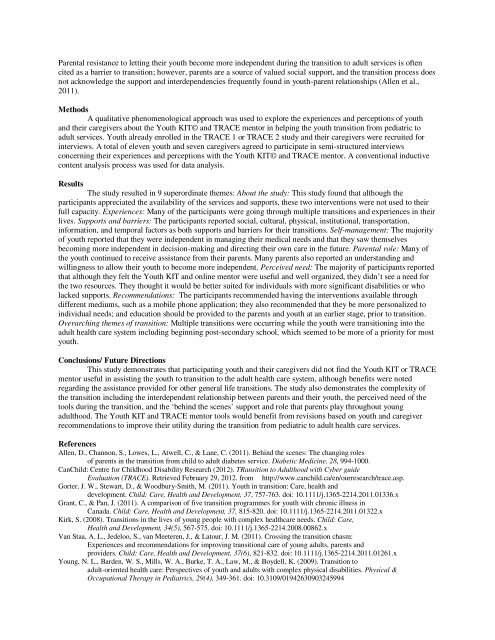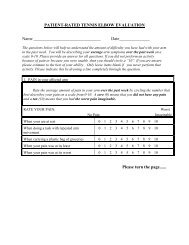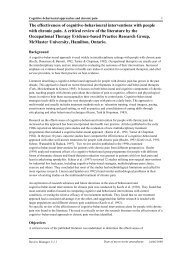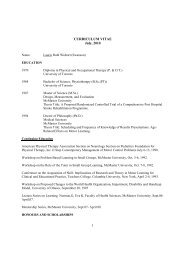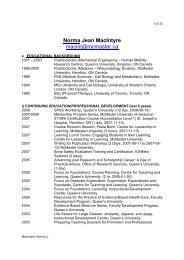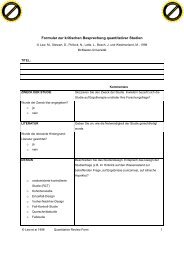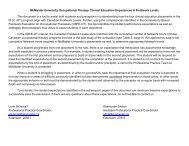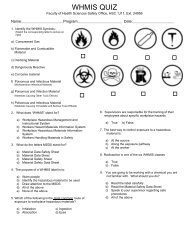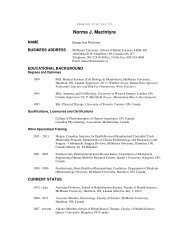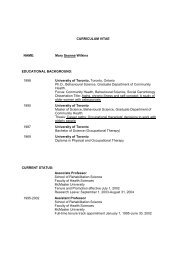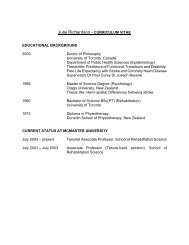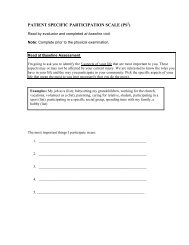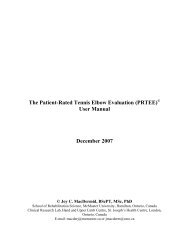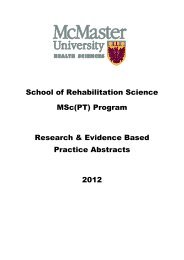Evidence Based Practice Symposium - McMaster University
Evidence Based Practice Symposium - McMaster University
Evidence Based Practice Symposium - McMaster University
Create successful ePaper yourself
Turn your PDF publications into a flip-book with our unique Google optimized e-Paper software.
Parental resistance to letting their youth become more independent during the transition to adult services is often<br />
cited as a barrier to transition; however, parents are a source of valued social support, and the transition process does<br />
not acknowledge the support and interdependencies frequently found in youth-parent relationships (Allen et al.,<br />
2011).<br />
Methods<br />
A qualitative phenomenological approach was used to explore the experiences and perceptions of youth<br />
and their caregivers about the Youth KIT© and TRACE mentor in helping the youth transition from pediatric to<br />
adult services. Youth already enrolled in the TRACE 1 or TRACE 2 study and their caregivers were recruited for<br />
interviews. A total of eleven youth and seven caregivers agreed to participate in semi-structured interviews<br />
concerning their experiences and perceptions with the Youth KIT© and TRACE mentor. A conventional inductive<br />
content analysis process was used for data analysis.<br />
Results<br />
The study resulted in 9 superordinate themes: About the study: This study found that although the<br />
participants appreciated the availability of the services and supports, these two interventions were not used to their<br />
full capacity. Experiences: Many of the participants were going through multiple transitions and experiences in their<br />
lives. Supports and barriers: The participants reported social, cultural, physical, institutional, transportation,<br />
information, and temporal factors as both supports and barriers for their transitions. Self-management: The majority<br />
of youth reported that they were independent in managing their medical needs and that they saw themselves<br />
becoming more independent in decision-making and directing their own care in the future. Parental role: Many of<br />
the youth continued to receive assistance from their parents. Many parents also reported an understanding and<br />
willingness to allow their youth to become more independent. Perceived need: The majority of participants reported<br />
that although they felt the Youth KIT and online mentor were useful and well organized, they didn’t see a need for<br />
the two resources. They thought it would be better suited for individuals with more significant disabilities or who<br />
lacked supports. Recommendations: The participants recommended having the interventions available through<br />
different mediums, such as a mobile phone application; they also recommended that they be more personalized to<br />
individual needs; and education should be provided to the parents and youth at an earlier stage, prior to transition.<br />
Overarching themes of transition: Multiple transitions were occurring while the youth were transitioning into the<br />
adult health care system including beginning post-secondary school, which seemed to be more of a priority for most<br />
youth.<br />
Conclusions/ Future Directions<br />
This study demonstrates that participating youth and their caregivers did not find the Youth KIT or TRACE<br />
mentor useful in assisting the youth to transition to the adult health care system, although benefits were noted<br />
regarding the assistance provided for other general life transitions. The study also demonstrates the complexity of<br />
the transition including the interdependent relationship between parents and their youth, the perceived need of the<br />
tools during the transition, and the ‘behind the scenes’ support and role that parents play throughout young<br />
adulthood. The Youth KIT and TRACE mentor tools would benefit from revisions based on youth and caregiver<br />
recommendations to improve their utility during the transition from pediatric to adult health care services.<br />
References<br />
Allen, D., Channon, S., Lowes, L., Atwell, C., & Lane, C. (2011). Behind the scenes: The changing roles<br />
of parents in the transition from child to adult diabetes service. Diabetic Medicine, 28, 994-1000.<br />
CanChild: Centre for Childhood Disability Research (2012). TRansition to Adulthood with Cyber guide<br />
Evaluation (TRACE). Retrieved February 29, 2012. from http://www.canchild.ca/en/ourresearch/trace.asp.<br />
Gorter, J. W., Stewart, D., & Woodbury-Smith, M. (2011). Youth in transition: Care, health and<br />
development. Child: Care, Health and Development, 37, 757-763. doi: 10.1111/j.1365-2214.2011.01336.x<br />
Grant, C., & Pan, J. (2011). A comparison of five transition programmes for youth with chronic illness in<br />
Canada. Child: Care, Health and Development, 37, 815-820. doi: 10.1111/j.1365-2214.2011.01322.x<br />
Kirk, S. (2008). Transitions in the lives of young people with complex healthcare needs. Child: Care,<br />
Health and Development, 34(5), 567-575. doi: 10.1111/j.1365-2214.2008.00862.x<br />
Van Staa, A. L., Jedeloo, S., van Meeteren, J., & Latour, J. M. (2011). Crossing the transition chasm:<br />
Experiences and recommendations for improving transitional care of young adults, parents and<br />
providers. Child: Care, Health and Development, 37(6), 821-832. doi: 10.1111/j.1365-2214.2011.01261.x<br />
Young, N. L., Barden, W. S., Mills, W. A., Burke, T. A., Law, M., & Boydell, K. (2009). Transition to<br />
adult-oriented health care: Perspectives of youth and adults with complex physical disabilities. Physical &<br />
Occupational Therapy in Pediatrics, 29(4), 349-361. doi: 10.3109/01942630903245994


